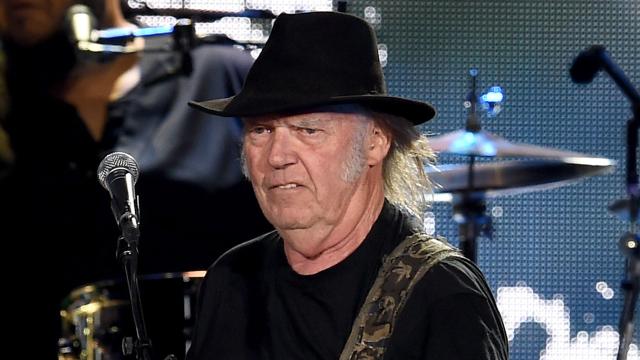Whether you believe that Neil Young is the lord of Luddites or a clear-eyed prophet of our impending digital destruction, most of us can probably agree that Facebook sucks. But not all of us take action to entirely disentangle ourselves from Facebook, and this is the difference between mortals and Neil Young. The 74-year-old rock star is apparently willing to pay $US20,000 ($27,892) to have Mark Zuckerberg’s monstrosity out of his life. And he’s getting rid of Google too, just for good measure.
On Tuesday, several outlets reported that Young’s website, Neil Young Archives, was informing users by email that a long-in-the-works plan to remove Facebook and Google logins from the site has been put in motion. The ubiquitous option to use this sort of convenient login for web services is one of the ways these data-hungry corporations manage to spread their information collection efforts far and wide.
For years, Young has high-quality streams of his music for a monthly subscription fee. Now, Young has turned his attention to criticising Facebook’s impact on our politics. (Also Google’s impact on society, I guess.)
Back in February, Young posted a note on his blog titled, “NYA Days Away From Dropping Social Media Platform.” He explained the plan to boot Facebook off of his home turf and gave his ideological reasoning, saying:
Facebook knowingly allows untruths and lies in its political ads to circulate on the platform, while bots sow discord among users. Sowing dissent and chaos in our country via political disinformation is something we can not condone. Simply put, Facebook is screwing with our election.
In the note, Young said that his “cost will be almost $US20,000 ($27,892) to disengage, while treating our subscribers with respect, making it as easy as possible for them to continue with us after Facebook.”
Six months later, Young’s email to subscribers indicates that he’s finally going through with his promise, even if it was a bit delayed. Though he hasn’t offered any recent criticism of Google, Young has complained about the search giant making money by linking to piracy sites. Regardless, he’s pulling the plug on Google, too.
If you’re a subscriber, I imagine this information might be relevant for you. For those of us who aren’t listening to After the Gold Rush as it was originally intended to sound, there’s just one nagging question: Why would it cost $US20,000 ($27,892) to remove Facebook and Google logins from your website?
We’ve reached out to the NYA to ask for more details on what was involved in the project and we’re genuinely curious to get a response.
In the Tuesday email, users are asked to “run through a quick process” in order to set up a new method of access. I could see that costing a bit to put together. But $US20k!? I don’t know, man.
I don’t have any further knowledge about the inner workings of the Neil Young Archives, and maybe this task was much more complex than it initially seems. Facebook and Google logins do offer a way to handle “secure” logins with relative ease, and maybe Young’s developers decided to build a system from scratch. Web development gets more annoying by the day, I’m not going to say that this process was easy. And it’s Neil’s money, so, whatever. Maybe he just saw what looked like a hassle-free price tag and took it.
This little blip in the counter-counter-counter-culture at least serves as a reminder that people shouldn’t build their websites with any unnecessary products from controversial big tech companies. It’s just asking for a headache on the day that one of them does something you find egregious, and they rack up egregious hits on a weekly basis. If it takes six months and $US20,000 ($27,892) to shift users away from a login button, imagine what a pain in the arse it’ll be to get rid of Facebook when its payments system has saturated the web.
